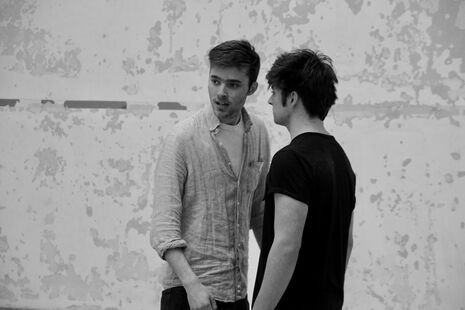Hamlet review: ‘staged intelligently and originally’
This highly atmospheric production is slightly let down by some aspects of its execution

It is difficult to think of a play more challenging to put on than Shakespeare’s most famous. The Bard’s magisterial writing, the weight of precedent, the outsize place it has in the theatrical imagination, and the complexity of its main character all combine to put immense pressure on any Hamlet production. It is to their credit that the team behind this production has not cracked under this weight.
Thematically speaking, the Round Church is certainly a fitting place to stage Hamlet. One of the advertised attractions of the production was of course the fact that the scenes would be set by candlelight, but I was nevertheless impressed by the execution. Several scenes were in near-darkness, lit only by candles held by the actors, giving, for example, the scene where Hamlet confronts the ghost of his father the spooky, otherworldly quality it sometimes lacks. That scene was noteworthy also for the very unique way in which it was staged: I shall avoid giving everything away, but those in the know will agree that it makes very good use of the intimate acoustics of the Round Church and was on the whole a brilliant set piece. It was certainly the best version of the scene I have seen in any Hamlet.
Blackburn’s rendition of Ophelia’s four songs was especially exquisite, and obviously left many impressed
Another highlight was the way music was interwoven throughout the production, again making good use of the acoustics. In this, Director Ben Lynn was ably assisted by the musical talents of Phoebe Schenk as one of the Players and Ella Blackburn as Ophelia. Both had solo parts and put in beautiful performances, betraying no hint of nervousness whatsoever. Blackburn’s rendition of Ophelia’s four songs was especially exquisite, and obviously left many impressed.
I was unfortunately less impressed by Lynn’s costuming decisions. One could suppose plausibly enough that the actors had simply turned up wearing whatever they were wearing beforehand. While in Varsity’s preview Lynn mentions his aim of having a stripped-down production, which justifies the minimalistic set, when it came to the costumes what bothered me was not the lack of period identity but simply of any coordination. There is some effort to have other characters dress more formally, while Hamlet bums around looking underdressed (a la David Tennant in the 2008 RSC production / 2009 BBC Two film), but this is undermined by the number of actors wearing jeans. Most costumes were at best earnest attempts to look formal, rather than actually formal. The result looks messy and distracting.
The core of any Hamlet is of course the actor playing Hamlet, one of the most challenging and most sought-after roles on modern stages. Jamie Sayers puts in a very creditable performance, but sometimes doesn’t measure up to the exacting demands of the role. His skittish physicality reflects Hamlet’s indecisiveness very well, and his delivery of Hamlet’s “O, that this too too solid flesh would melt” was tortured and gripping, but in contrast I was disappointed with “To be, or not to be”, which I felt was verging on melodrama.
Alex Hill as Claudius does a very good job of presenting himself with obsequious charm when he needs to “smile, and smile, and be a villain”, but I was disappointed with his interpretation of Claudius’ most emotional moment, the scene when he attempts to pray for forgiveness. The power of this scene comes from Claudius’ sudden fear of the possible consequences of his misdeeds in the afterlife, but for me that fear was not palpable at all.
On the other hand, I was very impressed with Ophelia (Blackburn) and Polonius (Will Hale). Hale carves out Polonius’ identity as a tiresome and fretful windbag to great effect, and drew the most laughs with his long-winded sermonising and pompous demeanour. Ophelia unfortunately does not appear in many scenes, but Blackburn’s portrayal was always spot-on.
In general, the cast’s performances were commendable, but not exceptional. There were enough mistakes with lines to be noticeable, which is understandable on account of how long Hamlet is, but unfortunate nevertheless. Despite Lynn’s best intentions, the fact that blocking was neglected in rehearsals does show, with several instances of actors almost colliding in the confined space. While it is obviously desirable to keep performances authentic, it is fundamental to theatre that not all inauthenticity can be banished, and blocking is probably more, not less important, in smaller spaces.
On the whole, however, I did enjoy this production, which was in at least some respects staged intelligently and originally. Many of the scenes brought Shakespeare’s lines to life and allowed me to appreciate the subtlety and elegance of his writing. I can confidently say that this production does justice to the Bard’s words.
 Features / Should I stay or should I go? Cambridge students and alumni reflect on how their memories stay with them15 December 2025
Features / Should I stay or should I go? Cambridge students and alumni reflect on how their memories stay with them15 December 2025 News / Dons warn PM about Vet School closure16 December 2025
News / Dons warn PM about Vet School closure16 December 2025 News / Cambridge study finds students learn better with notes than AI13 December 2025
News / Cambridge study finds students learn better with notes than AI13 December 2025 News / News In Brief: Michaelmas marriages, monogamous mammals, and messaging manipulation15 December 2025
News / News In Brief: Michaelmas marriages, monogamous mammals, and messaging manipulation15 December 2025 Comment / The magic of an eight-week term15 December 2025
Comment / The magic of an eight-week term15 December 2025









